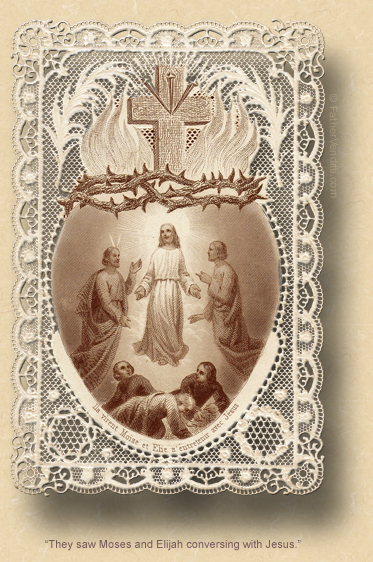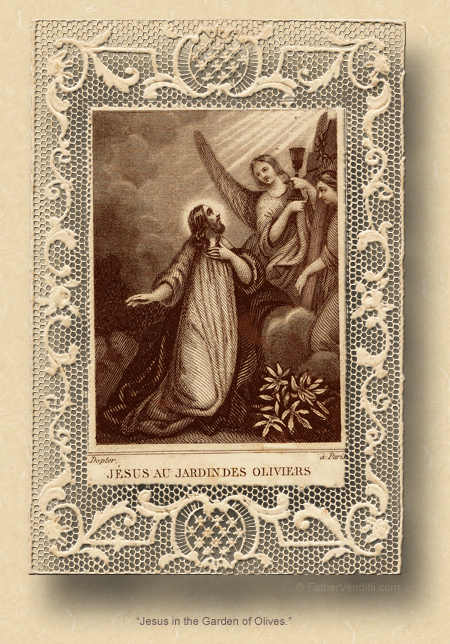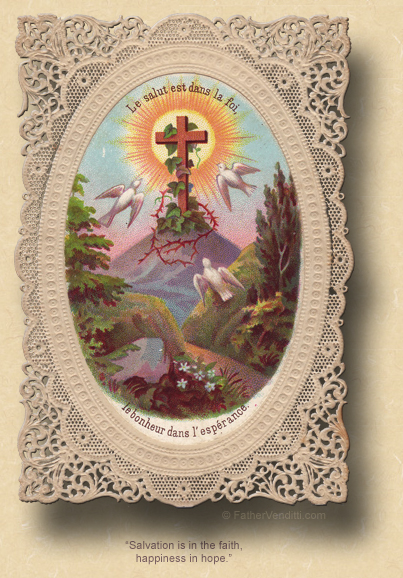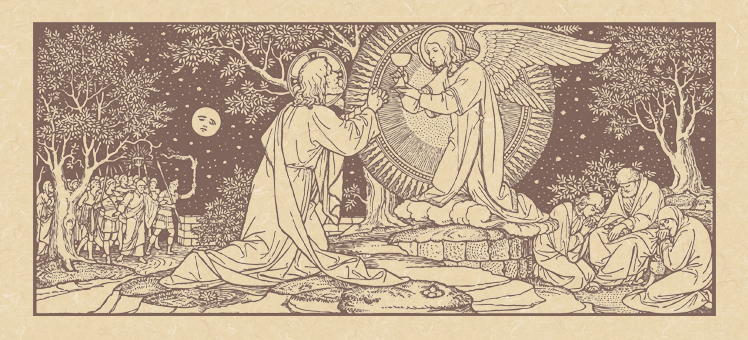The Forgotten Virtue.
The Nineteenth Sunday of Ordinary Time.
Lessons from the tertiary dominica, according to the ordinary form of the Roman Rite:
• Wisdom 18: 6-9.
• Psalm 33: 1, 12, 18-22.
• Hebrews 11: 1-2, 8-19.
[or, 11: 1-2, 8-12.]
• Luke 12: 32-48.
[or, 12: 35-40.]
The Ninth Sunday after Pentecost.
Lessons from the dominica, according to the extraordinary form of the Roman Rite:
• I Corinthians 10: 6-13.
• Psalm 8: 2.
• Luke 19: 41-47.
FatherVenditti.com
|
 10:32 AM 8/11/2019 — Maybe it’s simply ironic, or maybe it’s by God’s design that a good portion of the Scripture lessons we’ve heard during this long, hot summer focus our attention on the need to seek after heaven and avoid the fires of hell. After the weather of the last couple of weeks, my idea of heaven is about 30,000 BTUs. 10:32 AM 8/11/2019 — Maybe it’s simply ironic, or maybe it’s by God’s design that a good portion of the Scripture lessons we’ve heard during this long, hot summer focus our attention on the need to seek after heaven and avoid the fires of hell. After the weather of the last couple of weeks, my idea of heaven is about 30,000 BTUs.
Last Sunday our Blessed Lord put before us the parable of the Foolish Rich Man who spent his whole life accumulating as much as he could rather than attending to the care of his soul, only to be told by God, “You fool! This very night your life will be required of you.” And all the Scripture lessons for the weekday Masses this past week were all different passages saying the same thing in different ways; and, what we should have noticed when celebrating the Feast of the Transfiguration last Tuesday: how the three Apostles—Peter, James and John—who were privileged to witness the vision of our Lord in heavenly glory, were destined to also be the three present with him during his Agony in the Garden, reminding us that the road to heaven is the Way of the Cross; all culminating in Friday’s Gospel lesson with a very direct statement by our Lord, which I give you in Msgr. Knox’s superior translation:
If any man has a mind to come my way, let him renounce self, and take up his cross, and follow me. The man who tries to save his life shall lose it; it is the man who loses his life for my sake that will secure it. How is a man the better for it, if he gains the whole world at the cost of losing his own soul? (Matt. 16: 24-26 Knox).
Our one purpose for being on this earth is to work out our salvation. Everything else is just window-dressing.
That last sentence is mine, not our Lord’s;—Msgr. Knox’s translation is not that free-wheeling—but, for those of us who may not have the kind of perfect faith that so many of the saints enjoyed, it raises the disturbing question: how can we be sure? How do we really know that the life of prayer, penance and sacrifice our Blessed Lord asks us to embrace will result in heavenly glory for us? How do we know that the Lord will keep all His promises to us? How do we know it’s all true?
 That, in fact, is the theme of the long, protracted and esoteric sounding Scripture lessons presented to us in today’s Mass. The author of the Book of Wisdom reminds the forlorn Jewish people of the confidence of their fathers, “that with sure knowledge of the oaths in which they put their faith, they might have courage” (Wisdom 18: 6 RM3). King David sings to us today in our Psalm: “See, the eyes of the Lord are upon those who fear him, upon those who hope for his kindness…” (Psalm 33: 18 RM3). We hear today the most famous line from the Epistle to the Hebrews: “Faith is the realization of what is hoped for and evidence of things not seen” (Heb. 11: 1 RM3).* And, of course, our Blessed Lord: “Do not be afraid any longer, little flock, for your Father is pleased to give you the kingdom” (Luke 12: 32 RM3). That, in fact, is the theme of the long, protracted and esoteric sounding Scripture lessons presented to us in today’s Mass. The author of the Book of Wisdom reminds the forlorn Jewish people of the confidence of their fathers, “that with sure knowledge of the oaths in which they put their faith, they might have courage” (Wisdom 18: 6 RM3). King David sings to us today in our Psalm: “See, the eyes of the Lord are upon those who fear him, upon those who hope for his kindness…” (Psalm 33: 18 RM3). We hear today the most famous line from the Epistle to the Hebrews: “Faith is the realization of what is hoped for and evidence of things not seen” (Heb. 11: 1 RM3).* And, of course, our Blessed Lord: “Do not be afraid any longer, little flock, for your Father is pleased to give you the kingdom” (Luke 12: 32 RM3).
I don’t know how many of your remember Pope John Paul I; he was only pope for a month, but he said something very important. He said that the Christian must learn to…
…lean on three basic truths: God is all powerful; God has a great love for me; God is faithful to His promises. It is He, the God of mercies, who fills me with confidence. With Him, I do not feel alone, or useless, or abandoned, but involved in a plan of salvation that one day will lead to Paradise (Address, Sept. 20, 1978).
Sometimes I wonder that, if he had lived longer, we would have heard a lot more about what I like to call the “forgotten virtue,” the virtue of Hope.
That’s why that first verse from our lesson today from Hebrews is so important for us to repeat to ourselves over and over again. It’s what we mean whenever we use the term “leap of faith.” And that, in itself, is a meditation. We all have hopes and dreams, and our Lord, through the author of Hebrews, is telling us that these hopes and dreams become real through faith.
Sometimes our hopes and dreams are hard for us to maintain, simply because they are just hopes and dreams, and hopes and dreams, so a person without faith would maintain, are not real. But it’s through faith that something that begins existence in our hearts can actually take on substance and change the whole of our lives. Our first two Scripture lessons remind us of these Old Testament figures as a kind of proof that hopes and dreams can be real if our faith is strong enough; after all, what happened to the ancients actually happened.
That’s the whole point of the our Lord’s Transfiguration on Mount Tabor. Peter, James and John were our Lord’s closest friends, but He knew that even they—who had more faith than all the others—still had their doubts. That’s why He let them see the Transfiguration, in much the same way that God rewarded the blind faith of those Old Testament figures. But bear in mind that, in both cases, these rewards for faith did not solve all their problems for them. Abel was still killed by his brother, Noah still had to build the ark, and—as I mentioned in the beginning—Peter, James and John, our Lord’s must trusted disciples, were the very same three whom our Lord chose to be with Him during His Agony in the Garden, and had to witness His passion and death.
 So it would be trite to suggest that hope is some kind of magic bullet in times of trouble, because it isn’t. And yet, it’s faith and hope that remind us, if only like a faint whisper in our ear, that our Lord is there, and has not left us to twist in the wind. We all go up and down: sometimes our faith is strong, sometimes it’s very weak, most of the time it’s somewhere in between. But our Lord is always there even when we don’t sense Him there. If we make the mistake of equating the presence of God in our lives with some sort of emotional experience, that’s when faith and hope start to break down, because faith and hope are not emotions, nor is our Lord’s presence indicated by some sort of feeling. That’s all the result of the therapeutic approach to religion which is so common today. Faith and hope are acts of the will, and acts of the will can be easy when we feel like it, and not so easy when we don’t. So it would be trite to suggest that hope is some kind of magic bullet in times of trouble, because it isn’t. And yet, it’s faith and hope that remind us, if only like a faint whisper in our ear, that our Lord is there, and has not left us to twist in the wind. We all go up and down: sometimes our faith is strong, sometimes it’s very weak, most of the time it’s somewhere in between. But our Lord is always there even when we don’t sense Him there. If we make the mistake of equating the presence of God in our lives with some sort of emotional experience, that’s when faith and hope start to break down, because faith and hope are not emotions, nor is our Lord’s presence indicated by some sort of feeling. That’s all the result of the therapeutic approach to religion which is so common today. Faith and hope are acts of the will, and acts of the will can be easy when we feel like it, and not so easy when we don’t.
Peter, James and John were all too pleased to have been given the grace to see our Lord in His heavenly glory on Mount Tabor; I doubt they were all that enthused to be on the Mount of Olives. But, they were still there, because they had faith and hope. That faith and hope didn’t spare them from sharing in our Lord’s sufferings, but did give them the strength to persevere. And when the passion was over, what they had hoped for became real when they could be with our Lord again in His resurrected body. And so it will be for us, if only we can muster the will to keep faith, the substance of our hopes, and the reality of what we cannot see.

* Ἔστιν δὲ πίστις ἐλπιζομένων ὑπόστασις, πραγμάτων ἔλεγχος οὐ βλεπομένων.
Literally: “Now faith is that of which [is] being hoped, [the] reality of things the proof [of which] not being seen.”
The Vulgate: “Est autem fides sperandarum substantia rerum, argumentum non apparentium.”
Msgr. Knox's rendering: “What is faith? It is that which gives substance to our hopes, which convinces us of things we cannot see.”
|

